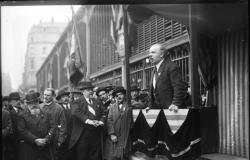For almost three years, Ukraine has been waging a fierce battle against the aggression of Russia, which has invaded its territory and now occupies some 20% of it. But this war, which is being played out at the gates of Europe, is not only a territorial conflict: it is a conflict in which divergent conceptions of the international order confront each other, it is a duel between two visions of world, between authoritarianism and its law of the strongest and democracy and the defense of freedom and international law.
France, Europe and NATO have engaged alongside Ukraine in what can be described as a proxy war, providing crucial military, financial and diplomatic aid to kyiv, including resistance and resilience command respect but which seem to arrive at the end of a cycle. Since the failure of its great spring counter-offensive which crashed against the solid Russian defenses and despite the unexpected incursion into the Kursk region, Ukraine is faced with colossal challenges: mobilizing and renewing its troops on a front which stretches over nearly 1,300 kilometers, where human losses are considerable.
Despite the courage, ingenuity and determination of the Ukrainian people and soldiers, the demographic and logistical reality imposes its limits. It is in this context that the idea of more direct military support, that is to say the sending of ground troops, comes back into the debate. Emmanuel Macron broke this taboo in February, attracting multiple criticisms from our allies and the bellicose and threatening hostility of Vladimir Putin. The French President, isolated, justified his remarks by the need to maintain “strategic ambiguity. »
The upcoming return of Donald Trump to the White House, which could result in a disengagement of the United States in its aid to Ukraine, leads the allies to ask themselves the question again: should we take the plunge and send ground troops fighting alongside the Ukrainians? This question was addressed during Prime Minister Ker Starmer’s visit to France on November 11. Paris and London are considering taking the lead in a coalition in Ukraine which could rely on the sending of Western troops and/or private defense companies, some of which have already made offers of service.
Sending troops on the ground – which does not necessarily consist of soldiers on the front line but of support – obviously tests the limits of co-belligerence that Westerners have always taken into account, particularly because of the hostility of public opinion – 68% of French people are against it according to a CSA survey published yesterday. The fear of an escalation of the conflict and a direct confrontation with Russia is tangible and yet, is it not precisely this fear which encourages the Kremlin to continue its aggression or to imagine others? The decision is not easy to make and if direct intervention could consolidate European unity in the face of the Russian threat, it could also precipitate a confrontation whose outcome would be uncertain.
In the end, beyond just the military or geopolitical aspects, the same question arises today as on the first day of the Russian invasion: what sacrifices are we ready to make to help the Ukrainians who are defending their sovereignty, their freedom, what we believe in? What is the price of freedom?






